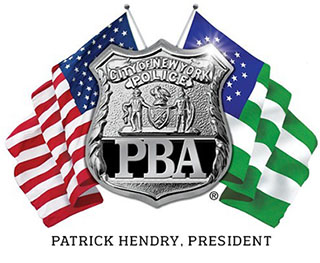





CONTACT:
John Nuthall
212-298-9187
CCRB grants itself the authority to initiate investigations without a complainant based on
unauthenticated YouTube videos among many other outrageous self-granted powers
The Patrolmen’s Benevolent Association of the City of New York (NYC PBA) today filed suit in Manhattan Supreme Court against the Civilian Complaint Review Board (CCRB) which has inappropriately granted itself powers that far exceed those established by the City Charter.
PBA President Patrick J. Lynch said:
“The CCRB has always been infected with an anti-police bias, and has never lived up to its responsibility under the City Charter to conduct ‘complete, thorough and impartial’ investigations of civilian complaints ‘in a manner in which the public and police department have confidence.’ But these recent rule changes are a bold-faced power grab to create a CCRB regime that is more abusive to police officers than ever before.
“Through their internal rule-making and resolutions, the CCRB has illegally vested itself with the authority to initiate investigations when no complaint has been made by a member of the public or to pursue complaints when the statute of limitations has expired, just to name two examples that clearly exceed their Charter powers.
“This is not just a case of mission-creep, it is a flat-out violation of the City Charter, existing laws and of legislative mandates. Furthermore, the CCRB seeks to undermine the authority of the Police Commissioner who is, under law, the arbiter of police discipline by requiring him to submit his decisions for their ‘reconsideration’ and by eliminating the required presence of an NYPD designee when hearing charges against an officer.
“The CCRB is an agency comprised of such anti-police personnel, that they will stop at nothing, they will violate any law and they will bend any rule just to penalize police officers who have the toughest and most dangerous job in the City. Based upon their own published statistics, nearly 94 percent of CCRB complaints do not result in any finding of wrongdoing by the police officer. But these baseless complaints have a real and painful impact on the falsely accused police officer. Still, the CCRB refuses to have complaints sworn to under penalty of law while they are quick to remind police officers that lying to them can result in dismissal. The deck was already stacked before these illegal rules were adopted and so, we are asking the court to level it out.”
Below is a list of the specific resolutions self implemented by the CCRB that the PBA is challenging in court.
The Late Complaint Rule — The CCRB has improperly authorized itself to investigate and make findings and recommendations on complaints filed after the expiration of the applicable statute of limitations.
Handling of Non-FADO Matters Rule — The CCRB has improperly authorized itself to investigate and make findings about undefined “other misconduct” that, by definition, is outside the CCRB’s limited jurisdiction over complaints relating to Force, Abuse of Authority, Discourtesy and Offensive Language (“FADO” Complaints).
Lack of Civilian Oath Rule — The CCRB has breached the Charter and created a gross inequity in the interview process by not requiring complainants or witnesses to make their allegations under oath and without warning them of the repercussions of false statements, while requiring Police Officers to be warned of substantial consequences for false statements.
Non-Complaint Investigations Rule — The CCRB has improperly authorized itself to commence investigations and make findings and recommendations without any complaint having been filed by a member of the public.
YouTube Complaints Rule — The CCRB has expanded the category of individuals with standing to file a CCRB complaint beyond persons who were allegedly harmed, and with a reach so broad that it includes persons who merely viewed unauthenticated videos on the Internet.
Reliance on Prior Meritless Complaints Rule — The CCRB has improperly authorized itself to consider prior unsubstantiated, unfounded, or withdrawn complaints — complaints which resulted in no finding of misconduct against the police officer — as the basis for its findings and recommendations.
Sexual Misconduct Investigation Resolution — The CCRB has suddenly granted itself the power to investigate complaints of sexual misconduct, rather than allowing the experienced bodies that have historically handled these types of complaints to continue to do so, without any legislative authority or rational basis for the change.
Undermine Plea Authority Rule — The CCRB has undermined the Police Commissioner’s authority to have final say over plea agreements.
Unauthorized Reconsiderations Rule — The CCRB has undermined the Police Commissioner’s authority to deviate from the CCRB’s recommendations by requiring “reconsideration” from the CCRB.
Excessive Prosecutorial Power Rule — The CCRB has improperly imbued its prosecutorial arm with powers reserved for the Police Commissioner.
Panels Without Police Commissioner Reps Rule — The CCRB has improperly and unfairly altered the balance of the CCRB panels hearing charges against Police Officers by eliminating the required presence of a NYPD designee.
Undermine Settlements Rule — The CCRB has improperly eliminated the execution requirement for settlements of complaints.
Executive Director Delegation Rule — The CCRB has improperly eliminated restrictions on the power of the Executive Director to delegate responsibilities.
See legal filing